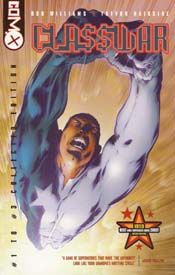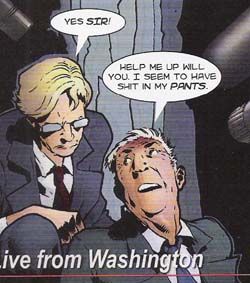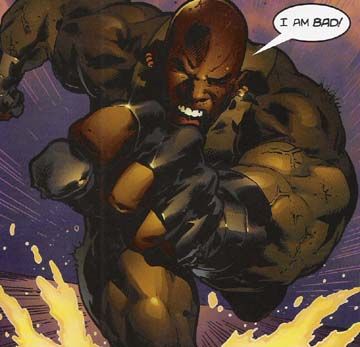 Script by Rob Williams, art by Trevor Hairsine
Script by Rob Williams, art by Trevor HairsinePublished by Com.X; $12.95
Collects Cla$$war #1-#3
Aided by a rogue Black Ops agent, the U.S.-sponsored superhero The American has decided enough is enough. Tired of being a tool for the rich and powerful, The American breaks with supergroup Enola Gay and wages war against the clandestine forces who pull the puppet-strings of presidents and generals in Cla$$war, Vol.1.
Tervor Hairsine’s art is the highlight of the trade. His style is of the same more realistic school of fellow pencilers Bryan Hitch and J.G. Jones and lends itself well to a superhero/conspiracy tale, just as it did later in Marvel’s Ultimate Nightmare.
Cla$$war’s concept is promising, and perhaps a bit more original than it may seem at first. Placing a superhero vs. government isn’t a particularly new idea, but Cla$$war’s battlefields seem closer to reality than those of Coup D’etat or DK2. The American’s grievances have nothing to do with catastrophes engineered by supervillain organizations or supervillain duos in control of the government, but are inspired by the same kinds of allegations real people make in the real world about the government; like warmongering for the sake of blind patriotism, sponsoring tyrants in the third world to keep the weak countries weak, and funneling drugs into low income areas to secure the docility of the powerless.
 Unfortunately, the writing doesn’t live up to the concept. The cornerstone of the series is best expressed by a blurb from Wizard on the front cover of the trade, describing Cla$$war’s superguys as "A gang of superheroes that make The Authority look like your grandma’s knitting circle". The story focuses on most of the characters’ decadent cravings, their blood-thirst, and their willingness to say "fuck" a lot. Even the President is depicted as a foul-mouthed imbecile, eagerly spouting profanities even in front of news cameras. Williams doesn’t seem able or willing to tone the stuff down enough to give the story the realism the concept demands. Understand, I have no moral qualms about violence, sex, or profanity in comics overall or specifically in superhero comics. Particularly in mature-oriented superhero comics however, authors tend to cross a line between using more "mature" elements to render a tale more realistic and overuse in order to make themselves sound cool; and it’s a line Williams wildly pole vaults over, muting the more human elements of the story and making the trade truly painful to slog through.
Unfortunately, the writing doesn’t live up to the concept. The cornerstone of the series is best expressed by a blurb from Wizard on the front cover of the trade, describing Cla$$war’s superguys as "A gang of superheroes that make The Authority look like your grandma’s knitting circle". The story focuses on most of the characters’ decadent cravings, their blood-thirst, and their willingness to say "fuck" a lot. Even the President is depicted as a foul-mouthed imbecile, eagerly spouting profanities even in front of news cameras. Williams doesn’t seem able or willing to tone the stuff down enough to give the story the realism the concept demands. Understand, I have no moral qualms about violence, sex, or profanity in comics overall or specifically in superhero comics. Particularly in mature-oriented superhero comics however, authors tend to cross a line between using more "mature" elements to render a tale more realistic and overuse in order to make themselves sound cool; and it’s a line Williams wildly pole vaults over, muting the more human elements of the story and making the trade truly painful to slog through.
If you’re looking for lots of blood, sex, and naughty words in tales of superguys going toe-to-toe with governments, Empire or Sleeper are more worth your time and money.

No comments:
Post a Comment